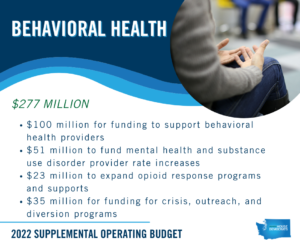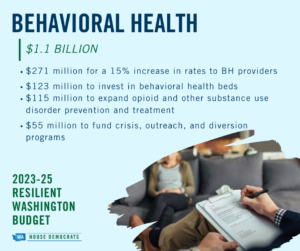Washington’s Democratic-led Legislature has focused on addressing growing behavioral health needs in communities across the state. Whether someone is living in active addiction to fentanyl or synthetic opioids, or a family is seeking mental health services for a loved one, integrating our health care system and investing in behavioral health services and workforce will ensure every Washington resident has hope they can heal and recover.
Since 2021, the Legislature has used federal funding to jumpstart the state’s behavioral health system, continuing and expanding those investments with state revenue to meet emergent needs particularly in the response to the growing fentanyl epidemic.
2021: One year into COVID-19, the Legislature dramatically expands behavioral health funding and access to care
 A dramatic increase of behavioral health funding was jumpstarted by federal funds, thanks to divisive action by the Biden Administration and Democrats in Congress passing the America Rescue Plan Act. With billions of dollars available for state spending over the biennium, we passed a budget that boosted behavioral health funding by $520 million, including more treatment beds with community providers, rate increases for mental health and substance use disorder providers, expanded mobile crisis teams, and injected funds into behavioral health providers impacted by COVID.
A dramatic increase of behavioral health funding was jumpstarted by federal funds, thanks to divisive action by the Biden Administration and Democrats in Congress passing the America Rescue Plan Act. With billions of dollars available for state spending over the biennium, we passed a budget that boosted behavioral health funding by $520 million, including more treatment beds with community providers, rate increases for mental health and substance use disorder providers, expanded mobile crisis teams, and injected funds into behavioral health providers impacted by COVID.
The Legislature also implemented the 988 system to create call centers to support people in crisis, coordinating with 911, medical response, law enforcement, and behavioral health systems to create a seamless system of care for those in crisis.
2022: Federal funding continues to support robust funding increases
 In the short session, Democrats continued to propose new laws and budget funding that built on the past year’s work. Concern over the impact of the pandemic on people with substance use disorder was rising and with that, Democrats responded. With an additional $277 million, we continued support the state’s behavioral health workforce with increased funding for rate increases, non-Medicaid services, opioid response programs and supports, and crisis, outreach, and diversion programs.
In the short session, Democrats continued to propose new laws and budget funding that built on the past year’s work. Concern over the impact of the pandemic on people with substance use disorder was rising and with that, Democrats responded. With an additional $277 million, we continued support the state’s behavioral health workforce with increased funding for rate increases, non-Medicaid services, opioid response programs and supports, and crisis, outreach, and diversion programs.
Lack of housing and treatment opportunities led to several key bills passing in the short session, including the Apple Health and Homes (HB 1866), housing benefits and community support services to those whose chronic homelessness was a key component to their lack of access to care. We also passed legislation to connect people to housing when being discharged from inpatient behavioral health care settings, to reduce the amount of people who go directly from receiving care to being homeless (HB 1860).
2023: Massive investments to bring needed resources to communities
 As communities began experiencing the end of pandemic-era restrictions, the need for further behavioral health support, particularly substance use disorder services, was growing. Democratic legislators proposed and passed a new biennial budget that included $1.1 billion in new funding to strengthen workforces in behavioral health, additional community bed capacity, crisis, outreach, and diversion programs, and youth behavioral health. That included $115 million to expand opioid and other substance use disorder prevention and treatment, with another $660 million for the new 350-bed forensic hospital and Western State and $21.1 million to added 136 beds at Maple Lane. Other behavioral health projects received $224 million for grants for community behavioral health services, a family-centered drug treatment and supportive housing project, and local facilities for crisis diversion, secure detox, and adolescent services.
As communities began experiencing the end of pandemic-era restrictions, the need for further behavioral health support, particularly substance use disorder services, was growing. Democratic legislators proposed and passed a new biennial budget that included $1.1 billion in new funding to strengthen workforces in behavioral health, additional community bed capacity, crisis, outreach, and diversion programs, and youth behavioral health. That included $115 million to expand opioid and other substance use disorder prevention and treatment, with another $660 million for the new 350-bed forensic hospital and Western State and $21.1 million to added 136 beds at Maple Lane. Other behavioral health projects received $224 million for grants for community behavioral health services, a family-centered drug treatment and supportive housing project, and local facilities for crisis diversion, secure detox, and adolescent services.
This funding supported the work done in SB 5536, in response to the Blake decision. Through this new law, treatment is prioritized to address drug addiction and improve public safety, while addressing the root causes of addiction. It offered accountability through community engagement, hope to those who are struggling, and a unified statewide system to ensure care is accessible no matter where you live. Over time, the strategic investments made will reduce the incidence of crime, homelessness, and other social issues, leading to stronger, healthier communities.
2024: Addressing the fentanyl crisis
The rise of fentanyl continues to cause harm in communities, with those who live with the pain of substance use disorder feeling the most harm. As funding from previous years continues to roll out into cities and towns across Washington state, Democratic lawmakers took the lead on a sharpened approach to ensure we are protecting our youth, expanding the skilled behavioral health workforce, and getting critical care for people living with untreated addiction.
 In the state operating budget, Democrats negotiated $215 million in funding for increased medication for opioid use disorder treatment, programs, and supplies, support for families and children safety, child welfare and school-based prevention and intervention, and outreach and support for tribal partners. Some of that funding comes from the expected $107M in the Opioid Abatement Settlement Account ending fund balance (approximately half of that account is appropriated).
In the state operating budget, Democrats negotiated $215 million in funding for increased medication for opioid use disorder treatment, programs, and supplies, support for families and children safety, child welfare and school-based prevention and intervention, and outreach and support for tribal partners. Some of that funding comes from the expected $107M in the Opioid Abatement Settlement Account ending fund balance (approximately half of that account is appropriated).
In addition, $245 million was allocated in behavioral health support for more funding for behavioral health beds, rate increases for the workforce, and better support for those with complex needs. And in the capital budget, about $83 million was included to construct or expand existing behavioral health facilities, including $45.6 million for substance use disorder, opioid, and fentanyl treatment facilities ($32 million specifically for tribally-operated facilities).
With bipartisan support, Democrats passed a package of bills that focused on treatment, outreach, training, and education. The six-pronged approach focused on: Community & Public Safety, Education, Prevention & Awareness, Recovery Support Services, Planning, Infrastructure & Workforce, Outreach, Crisis Response & Harm Reduction, and Treatment.
Community & Public Safety: Three new laws to prioritize child safety and family support, ensure accountability through expanded cooperation between state, local, and tribal governments, and new model standards to certify canine teams in the detection of fentanyl (SB 6109, HB 2305/SB 6146, and HB 1635).
Education, Prevention & Awareness: Six bipartisan laws passed to create drug overdose prevention and awareness campaigns in the K-12 system, in institutions of higher education, and statewide through the Department of Health, as well as funding for medical practitioners struggling with substance use disorder, expanded funding for medical practitioners struggling with substance use disorder, and funding for tribal governments from the opioid abatement settlement account (HB 1956, HB 1972, HB 2112, HB 2396, SB 5906, SB 6099).
Planning, Infrastructure & Workforce: Three new laws to expand opportunities in behavioral health workforce, community funding of basic law enforcement academy classes, and streamlining licensing for Indian Health Care providers (HB 1946, HB 2075, HB 2475/SB 6301).
Outreach, Crisis Response & Harm Reduction: Two new laws that ensure that needed medications, such as opioid reversal medications, are available in our schools and to our public health officials (HB 2029/SB 5804, SB 6095).
Treatment: Two new laws to better coordinate behavioral health services with the Indian behavioral health system and ensure that at least 14 days of inpatient substance use disorder treatment are covered by all health plans so that when someone needs help, they can get it (HB 1877, SB 6228).
Recovery Support Services: A new law that establishes the post-inpatient housing program, which will provide crucial support and housing for young adults with behavioral health needs until they are 24. Through this innovative approach, young adults will have a way to transition smoothly back into life and reduce the risk of falling into homelessness (HB 1929).
Legislative Budget Notes expected in the Fall of 2024. Below is a link to items for all substance use disorder investments, including investments specifically dedicated to opioid and fentanyl prevention and response.
All Opioid & Other SUD Investments
